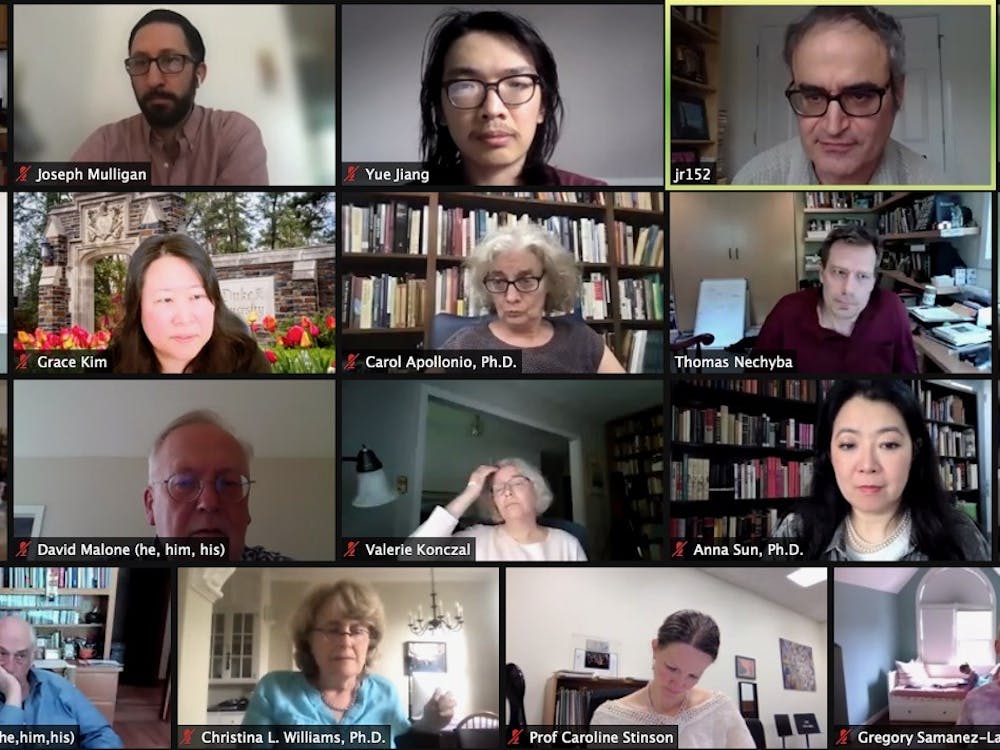At Thursday's Arts and Sciences Council meeting, Trinity College faculty heard three proposals—on satisfactory/unsatisfactory grading, credit for non-Duke courses taken online and course evaluations.
All three proposals will be brought up for votes at future council meetings.
Cary Moskovitz, chair of the council's Curriculum Committee and professor of the practice in the Thompson Writing Program, presented a proposed new policy that would ask professors to decide whether classes can be taken with an S/U grading system prior to registration, and at the least before the first day of classes.
"Instructors will indicate at the time of enrollment and no later than the beginning of the course if letter grades are mandatory; otherwise, S/U grading is permitted by the instructor," reads the proposed language of the policy.
The proposal follows up on discussions that the council had in February about expanding S/U grading to give students more leeway on counting S/U classes toward curriculum requirements. Those changes were approved in March, and Thursday's proposal only focused on the timeline for professors deciding whether or not to make their courses available S/U.
Moskovitz emphasized that the expectation is that faculty will allow it unless they have a clear reason not to.
"We really want to have it be a culture that faculty understand that students should be allowed to take a course S/U unless there is a sound pedagogical reason to deny them that," Moskovitz said.
With the proposed change, students will still have to get approval from academic deans to take classes S/U, but they would know in advance whether a professor allows it as a blanket policy.
Jakob Norberg, associate professor of German studies and chair of the Committee on Undergraduate Teaching, Academic Standards and Honors, laid out a proposal to give students the chance to earn credit for virtual courses taken away from Duke.
Usual rules require that classes taken away from Duke—including transfer students' courses, pre-matriculation courses, study abroad courses and some others—be in-person rather than online in order to count for credit. During the COVID-19 pandemic, Trinity had already loosened some restrictions, and the proposal would extend those changes.
Institutional transfer credits and interinstitutional credits would both be accepted for online classes through the summer, while study abroad credits would be accepted virtually through the end of the fall. The policy would also allow online pre-matriculation credits to count going back to fall 2020.
Last, the council also heard a proposed framework that the Assessment Committee will use as a guide as it overhauls Trinity's course evaluation system. The new course evaluations, which the council discussed in January, will be more flexible for both students and faculty, and they are possible after Duke recently signed a contract for a new system.
The framework includes guiding principles for future changes, including reducing the number of questions that are asked to students in all courses and possibly making the system opt-in, rather than opt-out.
In Other Business
Council members elected Márcia Rego, associate professor of the practice in the Thompson Writing Program, to the council's executive committee. Rego received 17 votes and José M. González, associate professor of classical studies, received 12 in the two-candidate election.
Neither candidate spoke at the meeting, as is tradition for executive committee elections, said José María Rodríguez García, associate professor of romance studies and chair of the Arts and Sciences Council.
Professor of Physics Christopher Walter suggested that in the future candidates for the executive committee be given the chance to introduce themselves prior to the election.
Rego will now join the executive committee, which includes six faculty representatives in addition to the council's chair, currently García. Council leadership is currently soliciting recommendations for that role and is planning on a two-person election.
"We wanted for that contest—for that election—to be fair to all of our 700 regular-rank faculty in arts and sciences," García said. "[We want faculty] to feel that the leadership of the council will be in good hands regardless of who wins because the two candidates should be eminently qualified."
Get The Chronicle straight to your inbox
Signup for our weekly newsletter. Cancel at any time.

